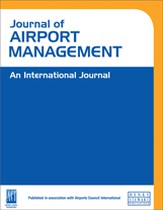Reimagining the role of hub airports as multimodal transport hubs in a sustainable future
Abstract
This paper explores the strategic importance of multimodality for airport hubs, especially considering sustainability goals that are pressuring airports to innovate. Although the European Commission (EC) has encouraged the transformation of airport hubs into multimodal transport hubs since 2011, most airport hubs prioritise aviation transfers over true multimodal connectivity. In response, Schiphol Airport has been taking active steps toward a multimodal future, supported by a collaborative PhD project with TU Delft, following an action research approach. Through iterative research cycles, this study reflects on Schiphol Airport’s efforts to address passenger needs and enhance multimodal services. The research includes cases focused on improving passenger experience in multimodal trips, developing a support system for rail/bus transfers, enhancing information services and conducting strategic sessions with key stakeholders. The findings show that creating a seamless multimodal travel experience requires attention to passenger needs for clear navigation, efficient hub facilities and consistent, real-time information throughout the journey. Reliable updates and knowledgeable staff enhance travellers’ confidence, while special transfer services and efficient coordination make the process smoother. Practical challenges persist, however, due to regulatory restrictions and the prioritisation of airline operations over multimodal initiatives. Achieving a robust multimodal system requires coordinated efforts across sectors and regulatory, infrastructural and service improvements. Overall, the findings highlight that long-term success in multimodal travel relies on deep collaboration and a shared vision among operators, hubs and mobility service providers, with the action research approach offering an effective way to facilitate this process by focusing on underlying needs and building trust among stakeholders.
The full article is available to subscribers to the journal.
Author's Biography
Aniek Toet is a PhD candidate at Delft University of Technology, embedded within the Royal Schiphol Group. Her research focuses on transforming airport hubs like Schiphol into passenger-centric multimodal transport hubs. Specifically, she explores integrating air-to-rail and air-to-bus travel options, aiming to enhance seamless multimodal journeys beyond the traditional emphasis on air-to-air transfers. With a strong commitment to practical impact, Aniek adopts an action-oriented approach, emphasising system integration while prioritising the end-user: the passenger. Her work seeks to understand and meet passengers’ needs and uses co-creation approaches with stakeholders to facilitate knowledge that not only advances academic theory but is also applicable in real-world contexts. Through this hands-on and collaborative process, Aniek aims to bridge the gap between research and practice, supporting Schiphol’s evolution into a future-ready multimodal transport hub that serves passengers seamlessly and sustainably.
Klaas Boersma is Senior Strategic Adviser – Master Planning at Schiphol Airport, one of Europe’s leading hub airports, responsible for providing strategic guidance, advising on critical decisions and shaping the airport’s long-term vision and masterplan. His extensive expertise and commitment to sustainability help to drive Schiphol’s intermodal agenda. Klaas’s influence extends beyond the boundaries of Schiphol. He has been at the forefront of efforts to extend the Amsterdam metropolitan metro lines, a crucial initiative for enhancing regional connectivity. He works closely with key stakeholders, including government bodies and rail authorities, to improve air-to-rail connectivity, making it more convenient and efficient for passengers to use alternative modalities. Klaas also sits on the board of Railforum, a rail sector community that aims to bring together all stakeholders within the Dutch rail sector. Klaas supervises academics in the field of airport planning and multimodal hub development in collaboration with Delft University of Technology and Academy of Architecture at the Amsterdam University of Arts.
Jasper Van Kuijk PhD is an Assistant Professor of user-centred innovation at the faculty of Industrial Design Engineering at Delft University of Technology, and a guest researcher at the Service Research Center of Karlstad University, Sweden. He studies how organisations develop (or aim to develop) products, services and systems that offer a positive user experience. His research focuses on identifying organisational characteristics and analysing aspects of development processes that contribute to or hinder the creation of usable and appealing solutions. Thus, he emphasises innovation and design practice in his work. Digitalisation, interorganisational collaboration, mobility and sustainability are other leading themes in his research. During his PhD, Jasper studied how consumer electronics manufacturers address usability in development, and later studied and contributed to the usability of the OV-chipkaart, the Dutch nationwide digital ticketing system for public transport. He also devotes considerable effort to public outreach about design and innovation, including writing a weekly column in a Dutch national newspaper and publishing several books for a wider audience.
